Burma/Myanmar: genocide and human rights violations
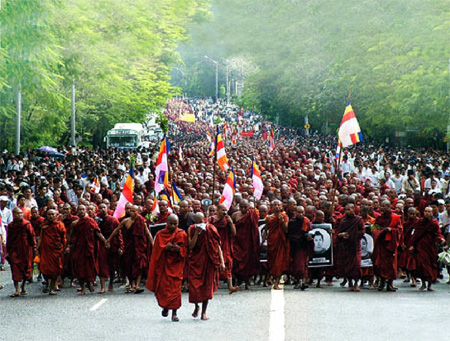
The Union of Myanmar is governed by a strict military regime. The current head of state is Senior General Than Shwe, who holds the posts of “Chairman of the State Peace and Development Council” and “Commander in Chief of the Defense Services”. General Khin Nyunt was prime minister until 19 October 2004, when he was replaced by General Soe Win, after the purge of Military Intelligence sections within the Burma armed forces. The majority of ministry and cabinet posts are held by military officers, with the exceptions being the Ministry of Health, the Ministry of Education, the Ministry of Labour, and the Ministry of National Planning and Economic Development, posts which are held by civilians.[42]
Several human rights organizations, including Human Rights Watch and Amnesty International, and the American Association for the Advancement of Science have reported on human rights abuses by the military government.[45][46] They have claimed that there is no independent judiciary in Burma. The military government restricts Internet access through software-based censorship that limits the material citizens can access on-line.[47][48] Forced labour, human trafficking, and child labour are common.[49] The military is also notorious for rampant use of sexual violence as an instrument of control, including systematic rapes and taking of sex slaves as porters for the military. A strong women’s pro-democracy movement has formed in exile, largely along the Thai border and in Chang Mai. The Women’s League of Burma is the leading women’s civil society organization, an umbrella organization uniting many smaller women’s ethnic organizations into a political force working for democracy and women’s human rights in Burma. There is a growing international movement to defend women’s human rights issues.[50]
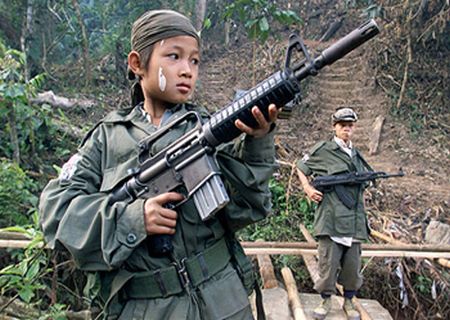
Until 2005, the United Nations General Assembly annually adopted a detailed resolution about the situation in Burma by consensus.[80][81][82][83][84] But in 2006 a divided United Nations General Assembly voted through a resolution that strongly called upon the government of Burma to end its systematic violations of human rights.[85]
In January 2007, Russia and China vetoed a draft resolution before the United Nations Security Council[86] calling on the government of Burma to respect human rights and begin a democratic transition. South Africa also voted against the resolution, arguing that since there were no peace and security concerns raised by its neighbours, the question did not belong in the Security Council when there were other more appropriate bodies to represent it, adding, “Ironically, should the Security Council adopt [this resolution] … the Human Rights Council would not be able to address the situation in Myanmar while the Council remains seized with the matter.”[87] The issue had been forced onto the agenda against the votes of Russia and the China[88] by the United States (veto power applies only to resolutions) claiming that the outflow from Burma of refugees, drugs, HIV-AIDS, and other diseases threatened international peace and security.[89]
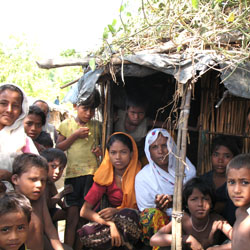
The Burmese military regime carries out systematic repression and human rights violations against the Rohingya ethnic minority living in Burma’s northern Rakhine State. The Rohingya also continue to be denied Burmese citizenship under the 1982 Citizenship Law which renders them stateless. Consequently many Rohingya asylum seekers flee to neighboring Bangladesh where the government, fearing a “pull-factor,” has become increasingly reluctant to harbor them.
Today Bangladesh hosts approximately 28,000 Rohingya refugees in the two camps of Kutupalong and Nayapara in its southern Cox Bazaar district. These are the Rohingya remaining from a wave of a quarter of a million who fled to Bangladesh in the early 1990s due to brutal persecution by the Burmese authorities. About 230,000 from that group were repatriated to Burma, with reports indicating many involuntary repatriations. The Rohingya currently living in the two camps refuse to go back to Burma citing fear of severe reprisals. There is also a large Rohingya population living outside the camps, estimated to be between 100,000-200,000. It is believed that many among this non-camp population returned to Bangladesh after being repatriated to Burma. The Rohingya who have come to Bangladesh after the large exodus of the early 1990s are denied entry to the camps and are not recognized as refugees by the government.
Source: Refugees International, Wikipedia
 burma, human-rights, civil-war, war, myanmar, politics, news, life
burma, human-rights, civil-war, war, myanmar, politics, news, life
-
1
Pingback on Feb 9th, 2014 at 2:54 pm
[…] by Genocide Watch, Foreign Policy in Focus, UN Dispatch, Der Spiegel writer Jürgen Kremb, the Kassandra Project, Ramzy Baroud of the Pakistani publication The Nation, and many others. Suu Kyi continued, saying […]
-
2
Pingback on May 23rd, 2021 at 7:25 am
[…] by Genocide Watch, Foreign Policy in Focus, UN Dispatch, Der Spiegel writer Jürgen Kremb, the Kassandra Project, Ramzy Baroud of the Pakistani publication The Nation, and many others. Suu Kyi continued, saying […]



 E-mail Subscribe
E-mail Subscribe

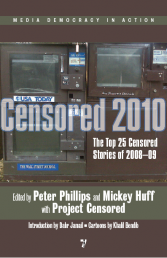


























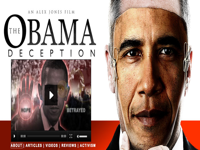






June 2, 2008 at 7:27 pm
What is happening in Burma-Myanmar is cruel. Killing someone because of something stupid. All the ones killing and hurting the Burmese, GO TO HELL!
June 4, 2008 at 7:57 am
Violence doesn’t make great anybody… All we need is conscience and action.
June 6, 2008 at 1:05 am
I understand on what Kassandra is talking about. We need action. Not just words. Somebody needs to step up there game and help these people. This is cruelty to humans, and my opinion is that Bush put his nose in the wrong business. This issue is more important.
June 6, 2008 at 5:34 pm
Thank you very much for our support my friend.
June 15, 2008 at 1:23 am
Man, the Tibetans have it easy compared to the Burmese
November 10, 2008 at 4:23 pm
Bush should’ve looked here before it became what it did. Something needs to be done with this, and I fear it may never come to light.
November 11, 2008 at 12:17 am
This is the sad truth my friend.
November 30, 2008 at 1:06 am
We can never win war with force .
we can win war with good policticks .
I cant spell but do have an understanding of
war is there to keep the population down .
keep on watching Rome with the next war some one is going to have the power to press the buttion .
the new us leader has an islamic/Tibe-rag hed religion.
I belong to the blue bean web site and understand world peice in 2012,
December 8, 2008 at 12:16 am
Is it possible to use content from this site in doco films?
December 8, 2008 at 11:51 am
Of course, just cite us my friend.
December 10, 2008 at 3:29 pm
Fight for Human rights!
Think first, than move.
Without a change our system will get down, and then everything changes- But in which course? Now we have the chance to brag the course, but if theres no change in the few future… We will see the outcomes.
February 17, 2009 at 3:35 pm
you say that we need is action. som monks say not to send any more weapons. but in this world we live in changing things with medial supplies dosent change much of anything. the only thing that can change is more violence. its all this generation knows. if you dont go in there without any weapons your not changin anything. look at the reality of this world. we profit off of war no matter what country it is. this to the regime in Burma is all buisness. You think that no military action has taken place…have you ever heard of Black Ops. I know that at least the U.S. is and Britian.
March 25, 2009 at 12:57 pm
hi
March 25, 2009 at 12:58 pm
im weird
November 9, 2009 at 10:06 pm
Sooooooooo sad.
February 9, 2010 at 4:58 am
i want to mayanmar genocide for my email.
thank you very much
March 17, 2010 at 12:25 pm
kill em all!!!!!!
March 17, 2010 at 12:27 pm
george bush rocks!!! ye hes my hero kill them iraqies and also violence helps its the onolyway to progression. population control baby! this is the easy way to control population, hey ive done it before kill a sister or 2 no big deal.
July 9, 2010 at 11:05 am
it is awfull
August 29, 2010 at 4:21 pm
http://tbgastro.wordpress.com/
December 13, 2010 at 9:01 pm
Sri Lanka Execution Original Clip Nov 2010 – Srilanka Genocide of Tamils – War Crimes Evidence
http://www.tamilsforobama.com/video/New_Video/Srilanka_Genocide_of_Tamils_War_Crimes_Evidence.html
December 5, 2011 at 5:23 pm
What is going on in Myanmar is very serious, and I agree that something has to be done about it, but I think that it is more complicated than we all think. We can’t just decide to do something and go ahead and do it. There are risks involved, and we have to be cautious doing something the wrong way could start a war, and then many more people would be killed. I am not saying that we should not do anything about this situation I just think that it needs to be approached the right way or the problem could get much bigger.
February 20, 2013 at 5:20 am
Good day! I could have sworn I’ve visited this web site before but after going through a few of the articles I realized it’s new to me.
Nonetheless, I’m definitely happy I stumbled upon it and I’ll be bookmarking it and
checking back regularly!